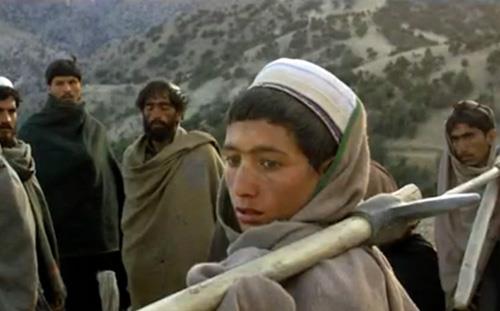
Maybe the most unexpected suggestion in The Longest War, a new documentary on America’s military intervention in Afghanistan, is that our presence there had some positive consequences.
Not a lot. But some.
The Longest War premieres Sunday at 10 p.m. ET on Showtime, immediately following the penultimate episode of Homeland, the long-running drama that has primarily revolved around the geopolitical dance between the U.S. and Afghanistan.
The documentary, directed by Greg Barker, was shaped largely by Alex Gansa and Howard Gordon, the creative team behind Homeland. While it’s clearly a companion piece, it does not directly reference the fictional drama, which at times has included eerie parallels to real-life developments.
In the broadest sense, The Longest War endorses what has become nearly a consensus among the American people: that our involvement there was an ill-conceived misadventure whose adverse consequences did not justify either the good we may have done or the cost we incurred while doing it.
Our Afghanistan military mission has cost roughly a trillion dollars, by the most widely accepted estimate. Some 2,400 U.S. soldiers died, and another 20,000 were wounded. Afghani casualties and costs have been a significant multiple of those numbers.
The Longest War is built mainly on interviews with more than a dozen CIA and military personnel who had personal involvement, which makes it different from documentaries that rely on outside commentators. Some of the speakers here relate their personal experiences, while others speak to what gradually became widespread disillusionment with the whole operation.
Some of the military witnesses reaffirm the troubling reports that we never really had a clear mission, meaning the presidents and generals who repeatedly delivered optimistic assessments of “progress” were, not to put too fine a point on it, lying.
Nominally we first sent troops to Afghanistan to help the CIA and our lower-profile sources find Osama Bin Laden, whose Al Qaeda organization carried out the September 11 attacks on New York and Washington.
At the time, Afghanistan was effectively run by the Taliban, a rigidly fundamentalist Islamic sect that banned, for instance, education for women.
We didn’t have any particular argument with the Taliban. In fact, we armed them in their earlier decade-long fight to repel Soviet invaders.
But once we were there ourselves, the Taliban wanted us out, so we became adversaries. To install what we hoped would be the seeds of democracy, we had to drive the Taliban out of power, which required an ongoing military presence. In theory, we were training Afghanis to defend their own budding democracy, but in reality, our presence was what kept that ball in the air.
Then in 2003, we invaded Iraq, which multiple commentators here say was a turning point because it diverted so many resources from the Afghan mission and meant that from that point on, we couldn’t leave without everything crumbling. So we have stayed for almost two decades, the longest active military mission in U.S. history.
The most compelling parts of The Longest War are the interviews with Afghanis and Americans who worked outside the military area. Their point, unanimously, is that Afghanistan has its own culture and is tired of being a pawn in international power struggles. It wants all of us foreigners to leave them alone.
These witnesses applaud some of the effects of the U.S. presence, like liberating the capital of Kabul from the Taliban’s oppressive laws. Women could go to school, popular music could be played, ideas could be discussed openly.
The dark shadow over that progress is that when the U.S. leaves, as President Donald Trump has said we will do, it’s not at all unlikely that the Taliban could move right back into power and negate all that progress.
Which could leave Afghanistan exactly where it was when we charged in two decades ago.
Several CIA witnesses in The Longest War argue that even that scenario wouldn’t mean we accomplished nothing. The Afghanis were in the midst of a civil war anyway, they say, and the U.S. just gave the better side an advantage and a foothold. They also say that the U.S. presence enabled American sources to learn about and thwart other potential Al Qaeda attacks, though, for obvious reasons, they don’t get specific about that.
The Longest War avoids directly debating the wisdom of the original decision to send the U.S. military to Afghanistan. Peripherally, it strongly suggests we were the victims of hubris. A news clip from the era has then-President George W. Bush saying that we had learned our lesson from Vietnam and were not going to get bogged down in an endless war that we could never win – which, of course, is precisely what we then did.
It’s hard to imagine any documentary on the U.S. involvement in Afghanistan giving off any other aura than frustration. This one suggests we had at least some good intentions and some temporarily positive impact, embedded in the darker morass of the rest.